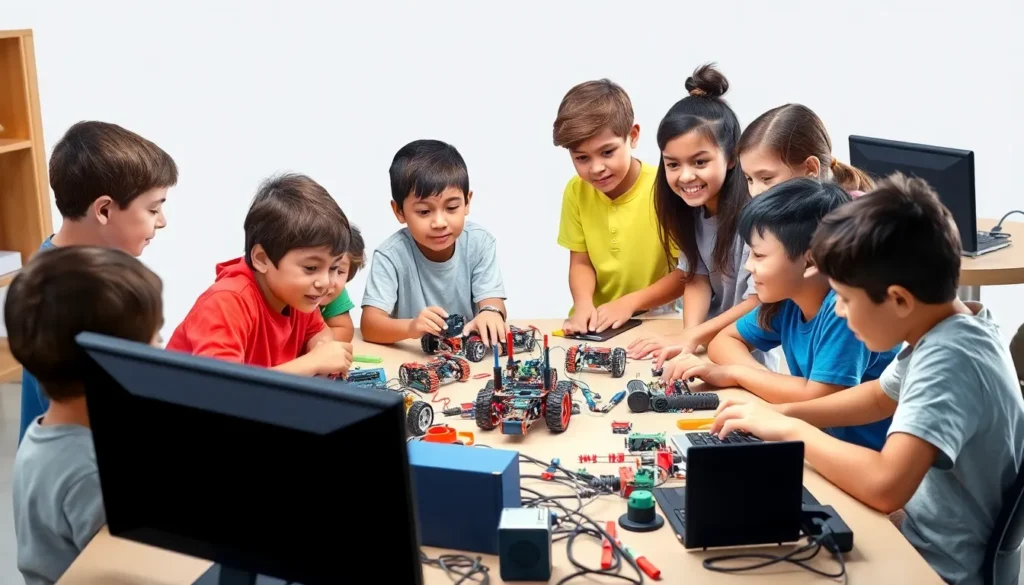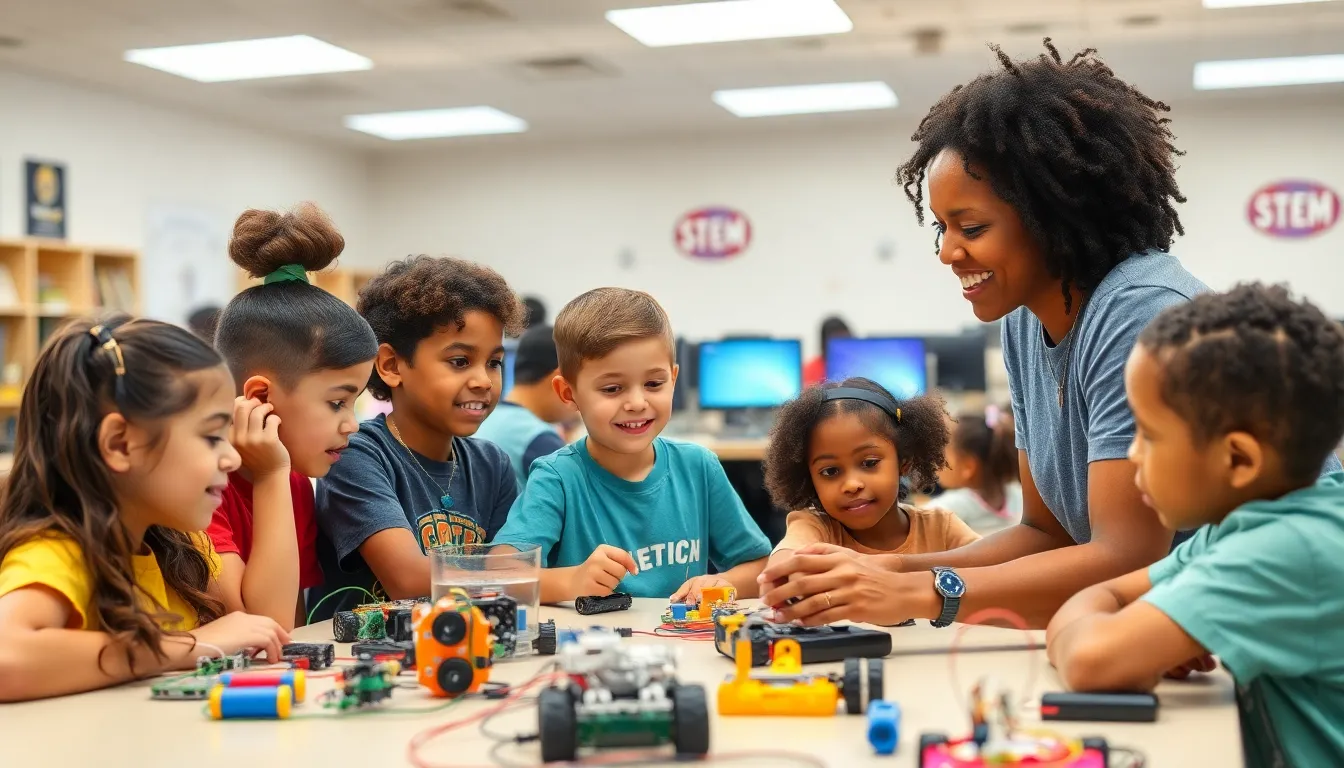Table of Contents
ToggleSTEM camp isn’t just a place for kids to escape the summer heat; it’s a launchpad for future innovators, inventors, and maybe even the next Einstein. Imagine a world where kids swap the couch for coding, and instead of scrolling through social media, they’re building robots that can almost do their homework. Yes, it’s as awesome as it sounds!
Overview of STEM Camp
STEM camps focus on Science, Technology, Engineering, and Mathematics education. Children participate in hands-on projects, experiencing real-world applications of these subjects. Engaging in activities like coding workshops and robotics challenges encourages creativity and problem-solving skills.
Focus areas at STEM camps often include computer programming languages such as Python, Scratch, and Java. Through interactive learning sessions, students grasp complex concepts, making them accessible and enjoyable. Various challenges promote teamwork and critical thinking by inviting participants to solve problems collaboratively.
Camp structures may vary, with some programs spanning several weeks, while others offer weekend or day-long workshops. Facilities often provide access to modern technology, such as 3D printers and virtual reality equipment. Moreover, expert instructors guide students, sharing their knowledge and experience in STEM fields.
Benefits extend beyond education; parents notice improvements in their children’s confidence and motivation. Exposure to collaborative environments prepares children for future academic pursuits and careers. Ultimately, STEM camps create a supportive atmosphere where children explore ideas and develop skills essential for future success.
Statistics show that students who attend STEM camps often demonstrate higher interest in STEM-related subjects in school. Increased engagement contributes to a growing pipeline of future innovators and professionals in technology and engineering sectors. Many camps encourage long-lasting friendships, fostering a network of peers who share similar interests.
Benefits of Attending STEM Camp

STEM camps offer various advantages that extend beyond education. Skill development ranks high among the benefits, fostering essential competencies in children. Students engage in hands-on projects, which advance their critical thinking and problem-solving abilities. Coding workshops sharpen programming skills, and robotics challenges enhance their technical knowledge. Children learn to work with languages like Python and Scratch, often building projects that demonstrate real-world applications. Confidence grows as they tackle challenging tasks, better preparing them for future academic challenges.
Social interaction represents another critical benefit of attending STEM camp. Children meet peers with similar interests, creating friendships that last beyond the camp experience. This collaborative environment encourages teamwork as participants work together on projects. Opportunities arise for networking, enhancing communication skills and fostering a sense of community. Engaging with like-minded individuals boosts motivation and inspires creativity, nurturing a passion for STEM subjects. Together, these interactions lay the groundwork for lifelong friendships and a supportive network for future endeavors.
Types of STEM Camps
STEM camps offer diverse formats to fit varying interests and schedules. Each type provides unique experiences, allowing children to delve deeper into specific STEM fields.
Day Camps
Day camps present a convenient option for families, running typically from morning until afternoon. Participants engage in interactive activities designed to spark curiosity. These camps often include coding classes, hands-on experiments, or engineering challenges. Flexible scheduling allows parents to manage work commitments while children benefit from immersive learning experiences. For example, a one-week day camp could cover different aspects of robotics each day, ensuring participants gain extensive exposure to essential concepts.
Overnight Camps
Overnight camps immerse children in an engaging environment for multiple days. Participants reside on-site, allowing for extended learning and interaction with peers. These camps offer a more intensive focus on subjects like astronomy or computer programming. Through projects, challenges, and group activities, children build teamwork skills while enjoying a communal living experience. An overnight camp might involve late-night stargazing sessions paired with astronomy lessons, creating lasting memories and deepening understanding of the subject.
Specialty Camps
Specialty camps cater to specific interests within STEM disciplines. These programs focus on niche areas such as robotics, coding, or environmental science. Children can select camps based on passion and curiosity, enhancing motivation and engagement. Often, these camps showcase advanced technology, including drones or virtual reality tools. For instance, a coding specialty camp might explore game development, where participants create their own games using programming languages like Python or Scratch.
What to Expect at STEM Camp
STEM camps offer an engaging and enriching experience that combines education with hands-on activities. Participants can look forward to a structured schedule filled with exciting challenges and opportunities.
Daily Activities
Daily activities at STEM camps are designed to be interactive and educational. Children might rotate through various stations, each focusing on different STEM concepts. They could learn programming basics in coding workshops, build robots during engineering challenges, or explore scientific principles through creative experiments. Workshops often feature tools like 3D printers or VR headsets, providing kids with up-to-date technology. Additionally, group projects encourage teamwork, allowing children to collaborate and share ideas as they tackle challenging tasks together. Each day presents new learning opportunities, keeping participants engaged and enthusiastic.
Learning Environment
The learning environment at STEM camps promotes exploration and collaboration. Instructors create a supportive atmosphere where curiosity is encouraged and questions are welcomed. Class sizes typically remain small, ensuring personalized attention for every participant. Participants work alongside peers who share similar interests, fostering a sense of community. This camaraderie enhances social skills essential for teamwork and communication. Outdoor spaces may also complement indoor learning, providing a balanced and stimulating environment for creativity. Overall, the focus on collaboration and exploration helps nurture a lifelong passion for STEM subjects.
STEM camps provide an invaluable experience that goes beyond traditional learning. They inspire children to explore their interests in science, technology, engineering, and mathematics in an engaging and hands-on environment. By participating in these camps, kids not only gain technical skills but also build confidence and foster friendships with like-minded peers.
The collaborative atmosphere encourages teamwork and communication, essential skills for future success. As children immerse themselves in coding, robotics, and innovative projects, they develop a passion for STEM that can lead to exciting academic and career opportunities. With a variety of camp options available, there’s something for every young innovator ready to embark on their journey in the world of STEM.






